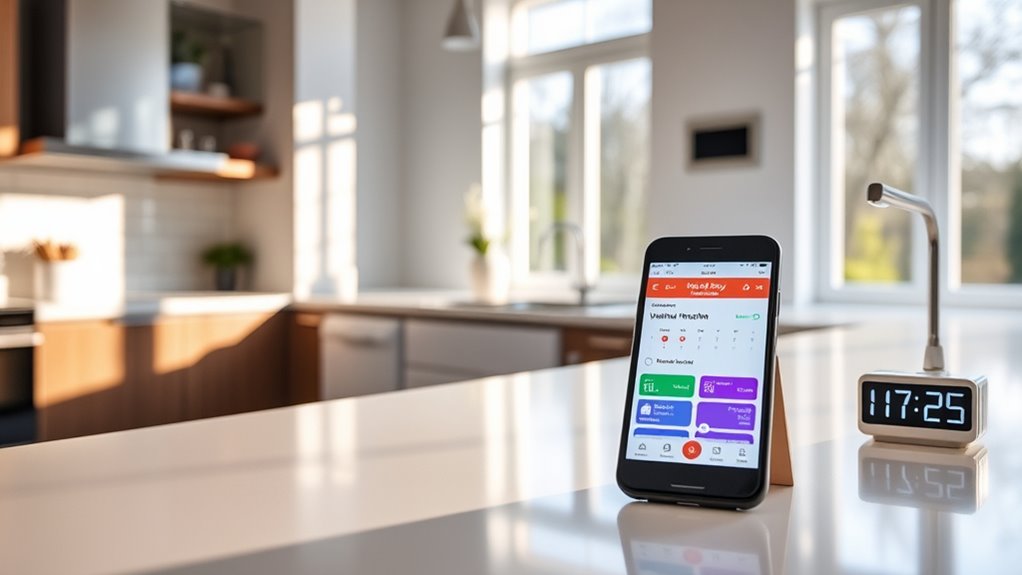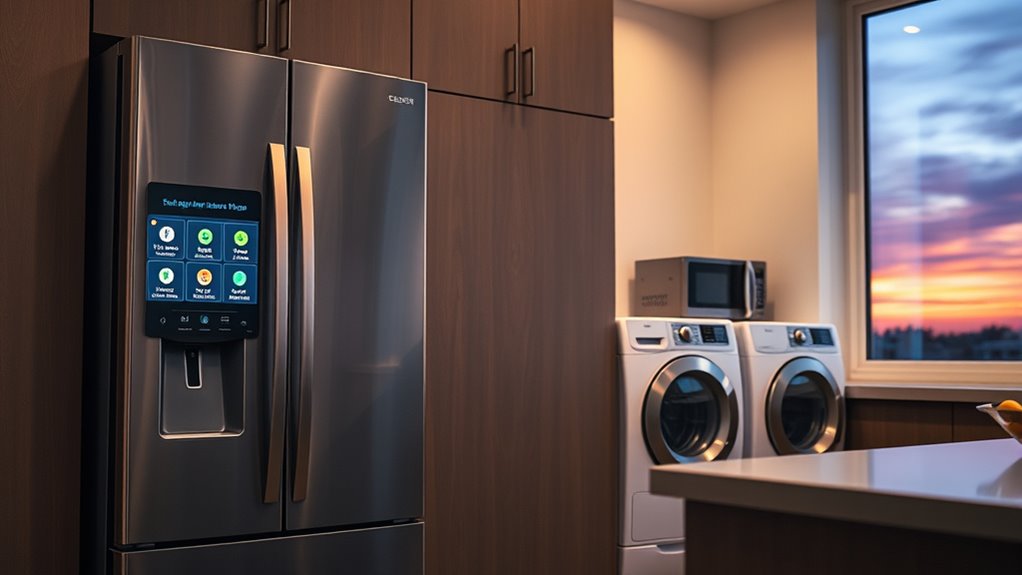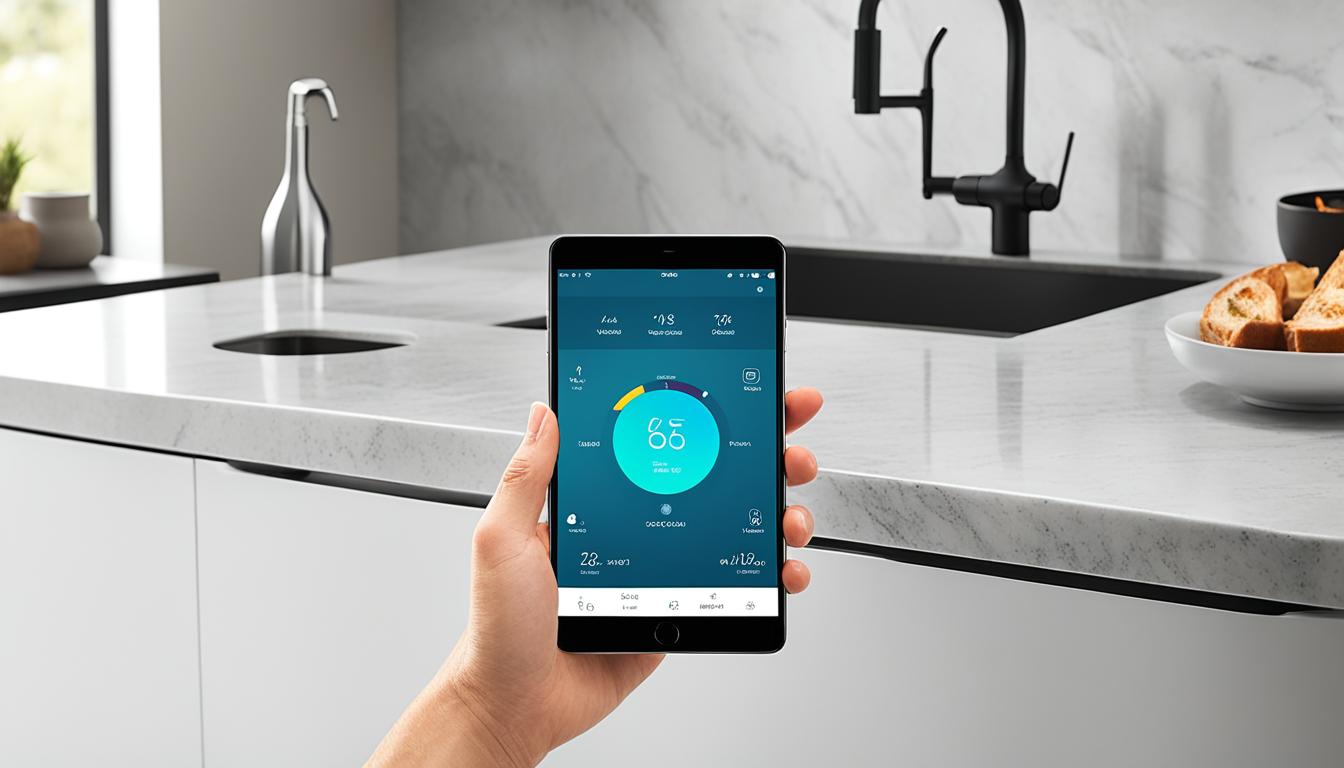To save on energy bills, schedule your appliances to run during off-peak hours, usually late evenings or early mornings. Use delay-start features on dishwashers, washing machines, and dryers to automate their operation. Adjust thermostats to higher or lower settings during peak times, then revert to normal afterwards. Properly maintain and insulate refrigerators and freezers, and set timers or choose smart lighting. Keep exploring to learn more tips for maximizing energy efficiency.
Key Takeaways
- Use delay-start or timer features on appliances to run them during off-peak hours automatically.
- Schedule heavy energy-consuming tasks like laundry or dishwashing during evenings or early mornings.
- Adjust thermostats to higher/lower settings during peak times and revert during off-peak periods for savings.
- Maintain and position refrigerators and freezers properly to ensure optimal efficiency and reduce energy waste.
- Install programmable or smart lighting controls to turn off lights when not needed, especially outside peak hours.

Have you ever considered how scheduling your appliance usage can save you money and energy? By planning when you operate your household devices, you can make a significant impact on your energy bills while contributing to energy conservation efforts. Utility companies often charge different rates depending on the time of day, with off-peak hours offering lower prices. Taking advantage of these times means you can reduce your overall energy costs and lessen the strain on the power grid.
One of the easiest ways to start is by running your dishwasher, washing machine, and dryer during off-peak hours. Instead of letting these appliances sit idle during expensive peak times, you schedule them for late evenings or early mornings when demand is lower. This simple shift can lead to noticeable cost savings, especially if you do multiple loads weekly. Additionally, many modern appliances have delay-start features, making it effortless to automate this process without disrupting your daily routine.
Refrigerators and freezers also benefit from proper energy management. Ensure they’re not overstuffed, which hampers airflow, or placed near heat sources like ovens or direct sunlight. Keeping these appliances well-maintained and properly set can improve energy efficiency. While these devices run continuously, minor adjustments and maintenance can reduce unnecessary energy consumption, further supporting energy conservation. Proper insulation of these appliances can also help maintain temperature and reduce energy waste.
Heating and cooling systems are among the most significant energy consumers in your home. By scheduling thermostats to operate at more energy-efficient settings during off-peak hours, you can reduce your overall energy use and costs. For instance, setting your thermostat a few degrees higher in summer or lower in winter during peak hours, then adjusting during off-peak times, can generate meaningful savings. Programmable thermostats make this easy, allowing you to automate temperature changes without manual intervention.
Lighting is another area where scheduling can make a difference. Use timers or smart lighting systems to turn lights off when not needed, especially during the day or late at night. This not only cuts costs but also promotes energy conservation by reducing unnecessary lighting.
Frequently Asked Questions
How Can I Automate Appliance Scheduling Effectively?
You can automate appliance scheduling effectively by using smart home integration, which allows you to control devices remotely and set schedules. Start with an energy consumption analysis to identify peak and off-peak times. Then, program your appliances to operate during off-peak hours, optimizing energy use and savings. This way, you maximize efficiency and reduce costs without manual effort, making your home smarter and more energy-efficient.
Are There Specific Appliances That Benefit Most From Off-Peak Use?
Ironically, your laundry and dishwasher are the biggest winners from off-peak energy. These appliance types often run on predictable usage patterns, making them perfect candidates for scheduling. By setting them to operate during lower-demand hours, you save money and reduce strain on the grid. So, if you want to maximize benefits, focus on these appliances first—they’re the most responsive to off-peak scheduling and totally worth the effort.
How Do Variable Energy Rates Impact Scheduling Strategies?
Variable energy rates, like time of use tariffs, encourage you to shift your appliance use to cheaper, off-peak times. You can save money by scheduling high-energy tasks during demand response programs, when utilities reduce strain on the grid. This approach helps you lower costs and support grid stability. By understanding these rates, you make smarter choices about when to run appliances, optimizing both savings and energy efficiency.
Can Scheduling Reduce Overall Energy Costs Significantly?
You can often enjoy notable cost savings by cleverly scheduling your appliances, leading to effective energy conservation. By shifting your usage to off-peak hours, you reduce your overall energy costs markedly. This strategy not only benefits your wallet but also promotes a more sustainable environment. Taking control of your energy habits makes a difference, helping you save money while contributing to a healthier planet.
What Are the Best Tools or Apps for Managing Appliance Timing?
You can use smart home apps like Google Home or Samsung SmartThings to manage appliance timing effectively. These apps often integrate with energy monitoring devices, allowing you to schedule appliances during off-peak hours automatically. By leveraging smart home technology, you gain real-time insights into your energy use and can optimize schedules, reducing costs. These tools make it simple to automate appliance operation, saving you money and improving energy efficiency.
Conclusion
By scheduling your appliances wisely, you can save energy and reduce bills, making it feel like you’re steering your home’s energy usage with the precision of a skilled captain. Off-peak times are like a quiet river—calm and less crowded—allowing you to get things done efficiently and affordably. So, plan ahead, shift your heavy-duty tasks, and enjoy the benefits of smarter energy habits that make your home run smoother and greener.









